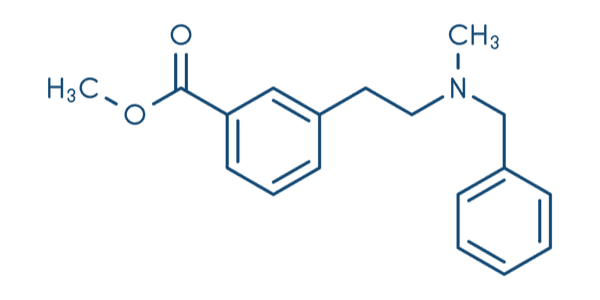PRL-8-53
Other names Methyl 3-(2-(benzyl(methyl)amino)ethyl)benzoate

PRL-8-53 is an underresearched compound described by some users as the most powerful working memory enhancer they have tried. But how science-backed is it really? Read on to find out.
This nootropic has no healthy human placebo-controlled studies that meet our inclusion criteria. Negative side effects can occur if used carelessly, so make sure you’re aware of the risks of PRL-8-53.
Benefits
Read about the effects of PRL-8-53 in relation to the amount of evidence we've found
Can PRL-8-53 improve your memory?
The study [1] was a placebo-controlled double-blind cross-over study, which means that every participant received both PRL-8-53 and placebo, on different days, and that neither participants nor researchers were aware of whether it was placebo or PRL-8-53 that had been given on any given day of cognitive testing.
Testing of memory performance was conducted 2-2.5h, 24h, and one week after the ingestion of the placebo or the drug. The memory test regarded verbal recall of word lists.
The test score data that was collected from participants 2-2.5h and 24h after placebo or PRL-8-53 included results from 52 and 43 people, respectively. For the 1-week data, test scores from 35 participants were analyzed. This means that about 1/3 of participants were not included in the 1-week data collection. The reason for this is not clear.
As for the results of the study, the following was found:
"The retention average for the subjects on drug is increased by 87-105%."
In the participants who performed worse after placebo, who are likely less cognitively proficient at baseline, PRL-8-53 had the greatest effects.
In fact, high performers had no improvements from PRL-8-53 when compared with placebo:
"Only the subgroup of high achievers fails to show significant improvement across the board. It must be kept in mind, however, that it is near impossible to obtain significant improvement figures when the control performance is near perfect to begin with."
The lead researcher behind this study argued that a more difficult test should be used to assess the cognitive effects of PRL-8-53 in healthy cognitively proficient people. This scientist was also the holder of the patent for PRL-8-53, which has now expired [2]. The fact that the lead scientist for this study had a financial interest in the results of the study decreases the amount of confidence that one should have in the findings of the study. While there is no reason to believe that he has manipulated any of the data in the study, he appears to have selected the tests in a manner that artificially increased the chances of statistically significant results. It is odd that he suggests that the tests used couldn't answer the very relevant question of whether PRL-8-53 is effective for cognitively proficient people. This is something that a more objective scientist would likely have handled in the design phase of the study - not when analyzing the results. To be fair to this researcher, it is (or at least was, it is getting better) common practice to conduct studies in a manner that increases the probability of reaching statistically significant results.
There were two other tests of cognitive performance included in this study, one of visual reaction time and one of motor performance. No effects were found in any subgroup of participants for these tests.
To conclude, the only study that has been conducted in humans on PRL-8-53 has severe methodological problems and needs to be replicated by other researchers with a better selection of psychological tests. Until more research has been conducted, it is very hard to make any valid conclusions regarding the efficacy of PRL-8-53 for healthy humans, especially in high performers.
There are several references to human studies other than this single published one that have supposedly been conducted on PRL-8-53 [3][4]. In the texts that referenced these unpublished studies, beneficial effects were claimed.
For anecdotal experience reports from people who have used PRL-8-53, see FAQ's below.
Risks
The legality and side effects of PRL-8-53
FAQ
Frequently asked questions about PRL-8-53
Studies
Studies conducted on the effects of PRL-8-53 in healthy humans
Last updated Saturday, June 10, 2023